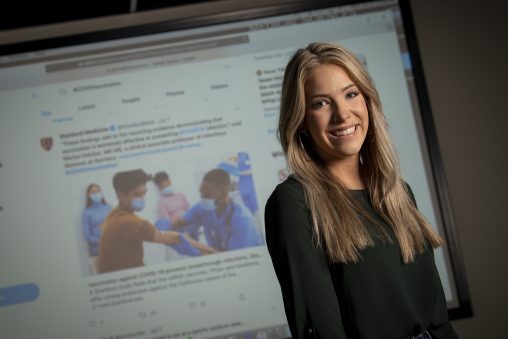
Graduate biological sciences student Emily Burwell is attempting to quantify the proportion of misinformation to validated information about COVID-19 on Twitter. (Photo by Erin Pence)
Trying to make an impact in the fields of science education and public health has become a passion for Emily Burwell, a Wright State University graduate biological sciences student researching COVID-19 truth from fiction.
Burwell, who also instructs classes on cells and genes, health and disease as a graduate teaching assistant, has researched COVID-19 messaging on Twitter. She has focused on information-related tweets, attempting to quantify the proportion of misinformation to validated information in them.
She used keywords, hashtags and code words to inventory over 1 million tweets mentioning COVID-19. She reviewed over 200,000 tweets that contain informational statements.
“Emily’s work sits at the cusp of the big data in education movement and will be read with a lot of interest in both the science education and public health fields,” said William Romine, Ph.D., associate professor of biological sciences.
Burwell hopes that her research may have an impact on the science community and beyond.
“I wanted to look at a problem that could apply to other diseases or public health in general,” she said. “Misinformation circulates social media and can leave lasting, detrimental impressions on people. This, in turn, creates a huge challenge for public health.”
“I can’t make people want to learn,” said Burwell. “I can only do my best to educate myself and make resources and information available to others.”
Burwell received a bachelor’s degree in biological sciences from Ohio University in 2020. Due to the pandemic, she decided to continue her education and enrolled in the Wright State Graduate School because of the opportunities it afforded her.
“Teaching classes helps keep my mind sharp,” she said. “Before attending Wright State performing biological research was a new concept.”
Once arriving at Wright State, Burwell needed to identify a research topic for her master’s thesis. She consulted with Romine and they considered what her research might focus on by first taking stock of her passions.
Her interests include disease, virology, epidemiology, anatomy and physiology and aspects of science that affect human life. Romine advised Burwell to consider continuing the work of a former Ph.D. student of his that focused on science and communication.
The rest, as has often been said, is history. But in this case, it might also be Burwell’s future too.
“This work is a great example of the range of questions scientists ask, and the creative and innovative approaches they use to find answers,” said Kathy Engisch, Ph.D., interim dean of the College of Science and Mathematics. “Emily may be getting a valuable educational experience, but she, in turn, is making a valuable contribution to our research mission.”
Stephanie Collins, communications and events coordinator in the College of Science and Mathematics, contributed to this article.

 Wright State psychology team studies ways to identify fatigue in pilots, drivers
Wright State psychology team studies ways to identify fatigue in pilots, drivers  Wright State videographer Kris Sproles wins Regional Emmy and Ohio journalism award
Wright State videographer Kris Sproles wins Regional Emmy and Ohio journalism award  Wright State Boonshoft School of Medicine ranked among the nation’s best for 2024 by U.S. News
Wright State Boonshoft School of Medicine ranked among the nation’s best for 2024 by U.S. News  Exposing biotechnology
Exposing biotechnology  Wright State faculty member Dan Noel uses unique background to inspire new leaders
Wright State faculty member Dan Noel uses unique background to inspire new leaders 